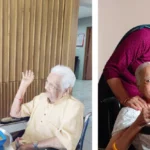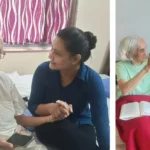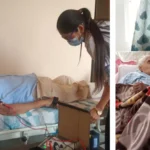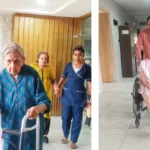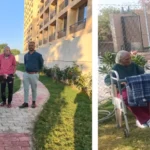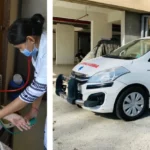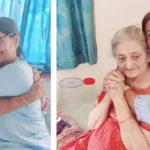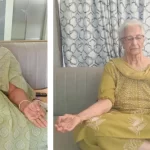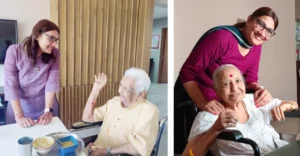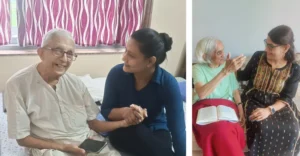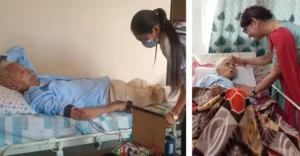An elder-person is a vulnerable lot and needs special care, especially after hospital care for the elderly for conditions or surgeries, due to weaker immune systems and degenerating cells. The hospital environment, the monitor’s syringes, departmental shifts, and unfamiliar people in and out all becomes exhaustive in addition to enduring the physical pains. They need extra care with a robust care plan to help them transition to a home environment and put them on the recovery road. Compromised immune systems need caregivers outside hospitals to be on the same page as medical experts at the hospital. The aim for all is to ensure our loved one is not back at the hospital for elderly care.
Challenges Faced by Elderly Patients Post Discharge
- Risk of infection: Post-discharge, any elderly patient needs to be in a sanitized environment with constant monitoring and minimal people contact. With their immunity at its lowest, the chances of catching infections are higher.
- Mind Fog: With all exhaustion, the mind gets tired and fogged, and even the mentally well patients find it hard to keep up with remembering medicine administration, monitoring water intake, or following diets. They need someone to supervise every little thing.
- Restricted movements: Elderly patients in hospital get confined to bed post-surgery or an illness, bringing in restlessness or a feeling of isolation. They need people to talk, interact, care, and be with them. The wheelchair-accessible spaces make it a possibility for many to go out of room for some fresh air.
- Bed sores or other related issues: Bed confinement requires major hygienic interventions like frequent bed turns to prevent rashes, bed sores, etc.
- Mood swings and emotional low: From an unknown hospital for the elderly environment to an environment that is in a careful mode, is controlled, and follows a pattern can be emotionally daunting and lead them to emotional ups and downs. It needs careful handling and tender care.
- Medical Monitoring: Post-discharge, a residential setup lacks monitoring devices, medical equipment, and devices, and arranging them on short notice gets challenging. Any dip in their health or vital fluctuations needs immediate attention from doctors.
7 Benefits of Private Hospital Care for the Elderly in an Assisted Living Facility Vs Home
- An assisted living facility has 24*7 staff, be it caregivers or nurses. They will ensure our loved one is monitored and cared for all the time. At home, most families have jobs to attend to and other responsibilities, making it challenging to offer care.
- They have required medical equipment, devices, and expertise to follow the doctor-led treatment protocol. While at home, it gets challenging and expensive to make the arrangements.
- Continuity/consistency of care is most crucial for elderly patients in hospitals, so it’s best to bring them over to a home-like environment like a facility that has hospital-induced facilities in it.
- Unlike private hospital care for the elderly, sanitized separate rooms at homes may not be a possibility putting them at higher risk of exposure to infections, coronavirus, etc. An assisted living facility caters to all potentially compromised immune systems.
- The facilities are often elder-proof with non-skid tiles, wheelchair access, hold bars, surveillance cameras, bedside alarms, etc. Installation of the same at home post-discharge requires higher financial investment.
- Assisted facilities have access to counselors and therapies for those who need upliftment, encouragement, and motivation to heal mentally and physically.
- Critical care like, rice tube feeding, intra venous medication, oxygen supply, ECG, etc., will be handled and administered within the premise.
You may like to read this: Aged Care – How to Take Care of the Aged? – Top Challenges & Solutions
PapayaCare- Best Choice for Hospital Care for the Elderly
PapayaCare offers all possible support, medical expertise, nutritious food, and counseling for a gradual recovery post-hospitalization. The post-hospital care plan gets carefully studied by the hospital team. The management ensures hospital appointments, medicine administrations, dressings, therapies, exercises, dietary needs, and vital monitoring gets followed with precision. Families get looped in with the progress made through video calls or scheduled visits. With staff around the clock, they do not feel isolated and get all possible assistance, be it bathing, feeding, grooming, laundry, and housekeeping. For post-surgery cases of outstations, if a relative needs to accompany the resident in the same room, it can be arranged at an extra cost. There is also an in-house ambulance stationed at the premise for emergencies. Papayacare is like a senior care hospital, where the team works together toward changing the lifestyle so that the body is not rapidly susceptible to diseases.
Conclusion
Most elderly patients, after surgeries, often return to the hospital within three months, mainly due to a lack of care or monitoring or non-cooperation to follow the prescribed rules. An assisted living facility will bolster the patients with confidence that they will make it better together. There is time spent through words, presence, patience, guidance, or healing therapies. Home cooked soft food suiting the individual conditions is offered, prepared in hygienic ways. For primary caregivers at home, it gets very tedious with additional responsibilities at home to devote that much time. Taking external till the recovery is the best way forward so they have medical assistance and monitoring available at all times. Care of elderly patients in hospital and after hospital is both crucial. We must extend that extra bit to them and enjoy that sunshine smile, knowing they are cared for.


